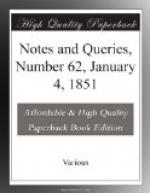J.F.F.
* * * * *
MINOR QUERIES.
Abbey of Shapp, or Hepp.—I shall be much obliged to any of your readers who can inform me whether the Chartulary of the Abbey of Shapp, or Hepp, in Westmoreland, is now in existence; and if so, where it is. In the Monasticon, vol. vi. p. 869., it is stated that in 1638 it was in the possession of Lord William Howard, of Naworth; but though a search has been made among Lord William’s papers and MSS. in the possession of his descendant, the Earl of Carlisle, at Castle Howard, the Chartulary is not now to be found among them.
J.C.
“Talk not of Love.”—Do any of your musical correspondents know the author of the following song, and whether it has ever appeared in print? I have it in manuscript, set to a very fine tune, but have never seen or heard it elsewhere.
“Talk not of love, it gives me pain,
For love hath been my foe;
He bound me with an iron chain,
And plunged me deep in woe.
“But friendship’s pure and
lasting joys
My soul was form’d to
prove,
Then welcome, win, and wear the prize,
But never talk of love.”
A.M.
Lucy and Colin.—Can you tell me who was the author of “Lucy and Colin,” so beautifully translated by Vincent Bourne, and by him entitled “Lucia et Corydon”?
In Southey’s Common-place Book, 3d series, I found the following in p. 712.:—
“Of the wretched poem Colin and Lucy (Tickel?) published as a fragment of Elizabeth’s age, the reviewer says, ’Is this the language of Q. Elizabeth’s time, or something better? But to whatever age, or to whatever author we are indebted for this beautiful piece, it must be allowed an honour to both, and therefore worth contending for on behalf of our own time.’”
I wonder whether this be the “Colin and Lucy” that V. Bourne translated.
I have not Tickel’s works, and therefore cannot discover whether he be the author of that beautiful (whatever Southey may say) ballad beginning with—
“In Leinster famed for maidens fair,” &c.
A.B.
Chapel, Printing-office.—Is there any other authority than Creery’s Press for the statement that printing-offices are called chapels? Whatever may have been the case, at present the word “chapel” is applied to the persons, or companionship, employed in the office, not to the office itself.




